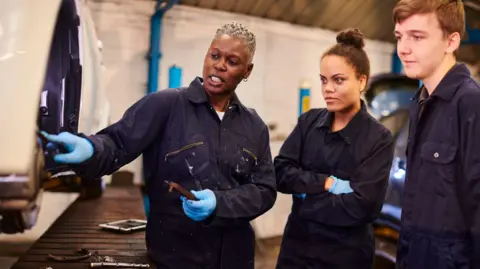 Getty Images
Getty ImagesLabour’s remarkable landslide provides a one-off opportunity to reboot and transform the British economy.
The incoming chancellor and prime minister know this, and I have been told that it is what they intend to achieve in office. Rachel Reeves told me she was seeking a “mandate for growth”.
They believe that they have won this election with a message of political and economic stability after years of chaos.
Liz Truss’ mini-budget loomed large in the minds of key swing voters, who got their feet on the property ladder in the period of near-zero interest rates, and voted for the Conservatives under former Prime Minister David Cameron.
Those newbuild housing estates, in every constituency – “Barratt Home Britain” – turned red. This underpins the incoming chancellor’s “iron clad” commitment to keep borrowing, and interest rates, under control. “Stability first” is the mantra.
But they have also privately been told by former Downing Street residents and by some captains of industry that “stability, while welcome, is not enough”.
While the Labour manifesto set out a mission and very broad strategy behind a stronger economy, it was not a detailed transformative plan. For example, public net investment is still set to be cut from current levels.
The big criticism of Ms Reeves’ vision of what she calls “securinomics” – a new model of economics where the government does more to prepare for the private sector to make massive investments in green industry – was a lack of money.
It is an attempt to emulate what US President Joe Biden is doing by investing by spending billions in new subsidies via loans and tax breaks targeted at green energy and vehicles. Labour’s plan is basically “Bidenomics without the cash”, critics say.
But Labour leaders have been reassured that there is a tidal wave of private investment – hundreds of billions by the end of the parliament – waiting to be made, if there is political, economic and policy certainty. But they need to act with speed to secure it.
Some key investors say they cannot wait another year for ponderous reviews of planning or energy policy, for example. Tens of billions in renewable investment, for example, is held up in planning disputes and a decade-long wait for a connection to the National Grid. This, Ms Reeves told me, had led to “an effective moratorium on building the cheapest forms of energy”.
 Getty Images
Getty ImagesBut there is some intrigue as to whether in government, Sir Keir Starmer and Ms Reeves will now boldly face down opposition, on house building or key net zero transition measures. If it’s going to work in transforming the economy quickly, it’s going to have to hurt some people.
There are a number of immediate challenges in the public finances. Further bankruptcies of councils and universities need to be dealt with. Shadow ministers report being staggered by the number of working families who are distraught about provision of special needs education, which has suffered from council cuts.
While Labour ruled out raising the main rates of tax, there are other taxes that could rise in an Autumn Budget. The work on that and a spending review will start very quickly.
More happily for many consumers and the public finances, the Bank of England could finally start to cut rates on 1 August.
An imaginative approach to strict public finance rules that allowed more upfront useful investment could prove irresistible.
The challenge now is to make tough “Big Bang”-style decisions that can transform Britain’s anaemic economic growth.
Labour didn’t want to get into these arguments ahead of the election. But given its huge majority, it will have more authority than any government in modern times to push through economic reform. Labour’s support base is also not in the areas most likely to vote against much-needed new infrastructure and housing.
The cautious approach that saw Labour meticulously protect its poll lead by not offering a lot cannot last into government.
As Ms Reeves herself told me this morning: “We’ve got to break out of a doom loop of low growth, high taxes and poor public services.”
In order to attract the sort of transformative investment needed to make the UK the fastest growing economy in the G7, Labour will need to be bold and decisive.




